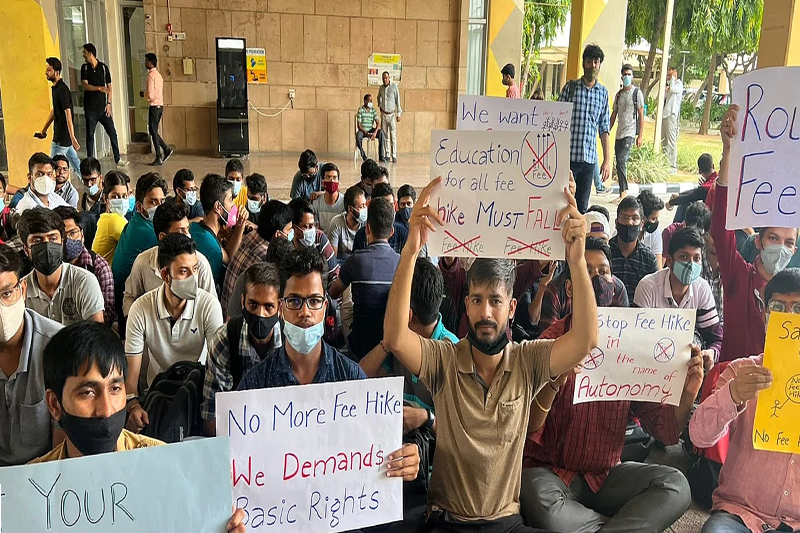
IIT Gandhinagar Students Protest Retroactive Fee Hike, Demand Clarity and Relief
The Indian Institute of Technology Gandhinagar (IIT-G) is embroiled in controversy. Students of the 2025-26 postgraduate (PG) batch have raised concerns over a retroactive fee hike implemented mid-semester. The hike, which increased the first semester fee by over ₹17,000, has sparked debates about fairness, transparency, and financial planning for students who had already completed fee payments.
Details of the Fee Hike
According to the students, the original fee for the first semester, communicated at the time of admission in April 2025, was ₹69,338. Following a Board of Governance meeting on June 21, 2025, the institute revised the first-semester fee to ₹86,400, increasing it to ₹17,062. The retroactive nature of this fee revision has caused significant dissatisfaction among students.
One student, requesting anonymity, noted, “The problem is not the hike itself but the retroactive application for a semester whose fees were already paid in May. If this had applied from the next semester, there would have been no issue.” The students argue that the sudden financial burden disrupts academic and personal planning.
Timeline and Communication Gaps
Students highlighted a serious communication gap that worsened the situation. Admission offer letters and fee structures were shared on April 10, 2025, with the confirmation and full fee payment deadline set for May 1. The full refund deadline was May 16, and the half refund deadline was June 1.
However, the fee revision was decided on June 21, weeks after the refund deadlines had passed. Students were officially informed about the hike only on September 3, 2025, with a payment deadline of September 15. This delay left them with no options to withdraw, seek refunds, or explore alternate academic arrangements, prompting frustration and a sense of injustice.
By contrast, MSc students were informed about the revision on July 10, highlighting an inconsistency in communication. First-year PG students feel disadvantaged and unfairly treated compared to other batches.
Students’ Perspective
Students emphasise that while the admission brochure mentioned that the fee structure “is likely to be revised,” retroactively applying this revision mid-semester violates the spirit of fair communication. “Any revision should be informed before payment deadlines and withdrawal dates—not after the semester has commenced,” students said.
They calculate that the fee hike would amount to nearly ₹40,000 more over the two-year course duration, imposing an unplanned financial burden on many families. Some students have already paid the revised fee under parental pressure, while others struggle with affordability and continue to seek clarification from the administration.
One student stressed, “Extending the payment deadline on a case-by-case basis does not solve the problem—there are people who cannot pay at all.” The lack of response from IIT Gandhinagar’s administration has intensified students’ frustration.
Interaction with the Administration
Several students approached the Dean of Student Affairs to discuss the issue individually and during the recent Open House, only to be redirected without resolution. Attempts to meet the director were similarly unfruitful, leaving students with administrative delays.
Second-year students reported a minor fee revision of around ₹6,300. Still, they were informed at the time of fee submission, avoiding the sudden financial shock experienced by first-year PG students. This contrast has highlighted concerns regarding equitable treatment and consistency in communication across different batches.
Impact on Students
The retroactive fee hike has financial and emotional implications for first-year PG students. Many cannot pay the revised fee due to pre-planned budgets, scholarship arrangements, or family constraints. Students fear such sudden increases may affect their academic focus, mental well-being, and long-term planning.
The hike also undermines the transparency of institutional processes. While the institute technically communicated the possibility of revisions in the brochure, students argue that mid-semester retroactive implementation violates trust and the principle of fair academic practice.
Call for Resolution
Students are urging IIT Gandhinagar to provide clarity and fairness, requesting that the revised fee structure be implemented only from the following semester. They emphasize that such retroactive adjustments set a precedent of financial unpredictability for future batches and are inconsistent with the institute’s reputed governance and student welfare standards.
Many students have taken to discussions with faculty and administration, highlighting that prompt response and flexible resolution are essential to restoring confidence among affected students. Without immediate intervention, student dissatisfaction could escalate and affect academic engagement.
Broader Implications
The situation at IIT Gandhinagar raises essential questions about financial transparency, student rights, and institutional accountability in premier educational institutes. Retroactive fee hikes, especially when communicated late, create stress and uncertainty, impacting students’ academic and personal lives.
It also underscores the importance of timely and consistent communication. Institutes must ensure that revisions, however justified, are not applied retroactively and that students are given sufficient notice and flexibility to make informed decisions.
Conclusion
The ongoing fee hike controversy at IIT Gandhinagar has spotlighted students' challenges due to retroactive fee structures. While institutions have the authority to revise fees, implementing such revisions after deadlines and mid-semester can be perceived as unfair and burdensome.
As first-year PG students await a response from the administration, the need for clear communication, equitable treatment, and flexible solutions becomes paramount. Moving forward, IIT Gandhinagar has an opportunity to address student concerns transparently, reaffirming its commitment to academic excellence while upholding fairness and trust.
The situation serves as a reminder to premier institutions across India to balance operational needs with student welfare and ensure that policies are implemented in a timely, transparent, and considerate manner.


